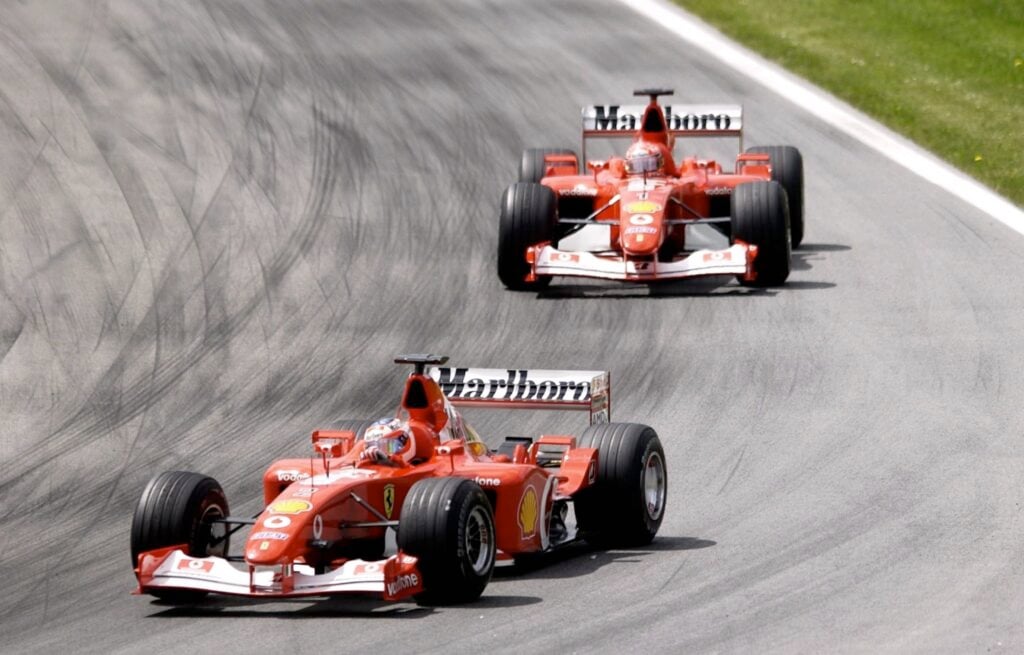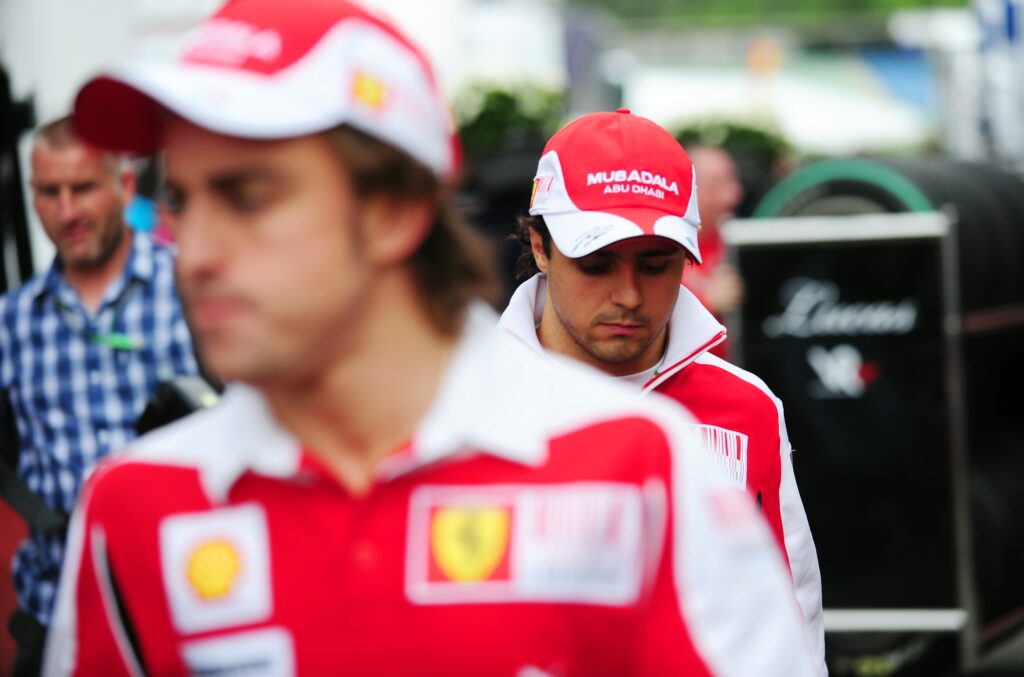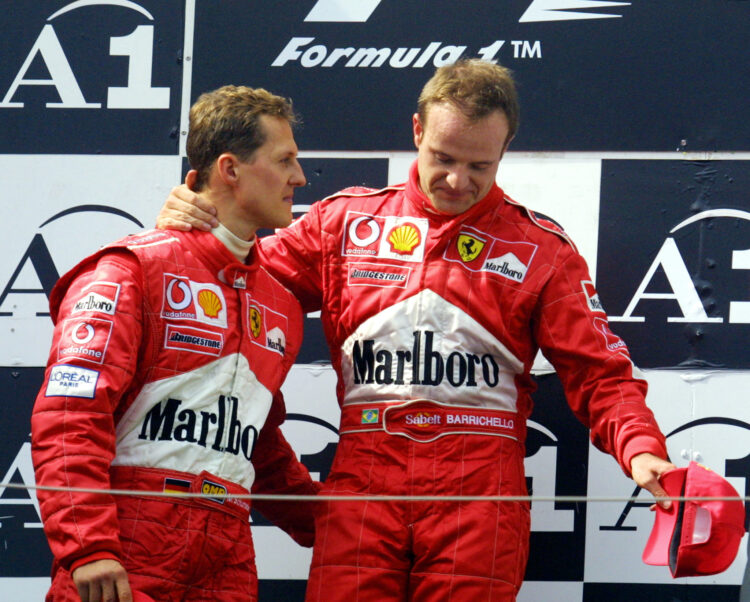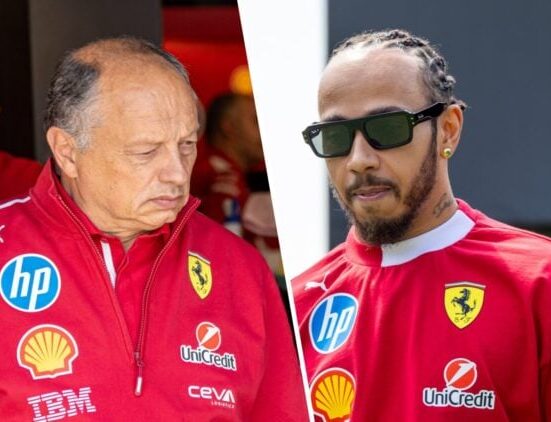Formula 1 teams are often confronted with making uncomfortable decisions between their drivers during the races if they are on different strategies.
The so-called ‘team orders’ are used to instruct one driver to exchange position with another who is faster, but they don’t always go to plan.
Sebastian Vettel famously ignored team orders during the 2013 Malaysian Grand Prix when he was told to hold station behind Mark Webber, while David Coulthard caused outrage amongst Australian fans when he ‘gifted’ the race victory in the 1998 Australian Grand Prix to teammate Mika Hakkinen.
Ferrari would later cause outrage amongst F1 fans with one move in 2002 which led to an £800k fine, a rule change, and humiliation for Michael Schumacher.

Ferrari caused uproar in team orders saga at 2002 Austrian GP
Ferrari entered the 2002 season with a dominant machine, with Schumacher winning four out of the first five races, one in their 2001 car and another three in their F2002 introduced at the third round in Brazil.
Coming into Austria, they had a comfortable lead in both the Drivers’ and Constructors’ Championships with Schumacher. Barrichello had only won one race with the team at the 2000 German Grand Prix and was close to taking his second victory.
Barrichello managed to secure pole at the A1 Ring (now Red Bull Ring) and was leading the race comfortably when Ferrari hatched a plan to ensure they scored the maximum number of desirable points.
The Brazilian was instructed personally by Jean Todt to move aside for Schumacher, so the German could score more points and edge closer to wrapping up the championship.
Barrichello initially refused, but ultimately let Schumacher past exiting the final corner of the final lap. It became a farce as both cars crossed the line by less than two-tenths, inadvertently generating one of the closest finishes in F1 history.
Ferrari were fined and Michael Schumacher was humiliated
The aftermath caused uproar among fans and press alike, largely due to how early Ferrari were using team orders to influence an outcome so early in the season – a viewpoint that was vindicated later in the season when Schumacher won the title with twice as many points as Barrichello.
Ferrari were booed by the crowd and Schumacher broke protocol by insisting that Barrichello take to the top step, even handing him the winner’s trophy.
The FIA was not happy, issuing Ferrari with a $1m (£800,000) fine for breaking protocol. Schumacher felt humiliated but explained the team’s rationale when speaking in the post-race press conference to ITV.
“I’m not very pleased about it. I think none of us are really. We have to look at, what are the team’s ambitions? And the team’s ambitions are to win the championship,” said Schumacher.
“You have to secure this [early] because you’re never going to know what will happen in the next races.”

F1 temporarily bans team orders after Ferrari saga
The FIA moved to ban team orders from the 2003 season onwards, adding this amendment to Article 15.2 of the F1 Sporting Regulations: “Team orders which interfere with a race result are prohibited.”
The rule was brought in response to the public outcry in the aftermath of Austria and what happened in Melbourne between the McLaren drivers, with fans feeling they felt robbed of a legitimate race result.
Over the years it would prove to be a difficult rule to enforce, with teams getting around it by using coded messages to drivers. One such example was the infamous “Fernando is faster than you” call issued to Felipe Massa while he was leading the 2010 German Grand Prix.
Ferrari were fined $100,000 (£80,000) but Alonso was allowed to keep his win. In their investigation, the FIA admitted the rule was difficult to police, and for the following season in 2011 the ban was lifted.
Nowadays, teams use them to their advantage, although to varying results. At the most recent race in Miami, Williams were at the centre of conflict when Alex Albon disobeyed team orders to stay behind Carlos Sainz, leading the Spaniard to declare that he “lost confidence” in the team after the race.
Ferrari were also caught up in a storm between Charles Leclerc and Lewis Hamilton in Miami, when the seven-time world champion grew frustrated with his team over their indecision on the pit wall.
Although they were being used way before Ferrari’s 2002 incident, the farcical scenes changed the course of F1 history and posed the question of whether success or the show comes first for teams.










Leave feedback about this